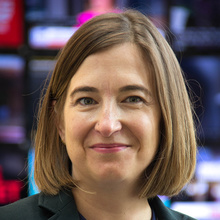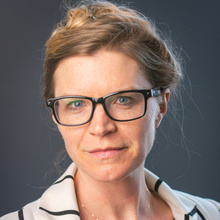By Abby Wedemeyer
Faculty, staff, and students in the College of Liberal Arts and Sciences play a central role in building university partnerships with communities throughout Iowa and beyond.
There are nearly 70 outreach and engagement programs in the college. Community-engaged research is among the college’s main priorities and is represented in the 2021-26 strategic plan.
To further support community-engaged research in CLAS, the college works with the University of Iowa Office of Community Engagement, which helps bridge the university and the community, offering training, workshops, informational resources, and expertise.
Two CLAS faculty members explain their work in community-engaged scholarship and why it is so meaningful.
Rachel Young is an associate professor and director of undergraduate studies in the School of Journalism and Mass Communication. She is also the faculty fellow in the Office of Community Engagement.
Rachel Young has over a decade of experience leading community-engaged learning initiatives.

Young launched the Coralville Media Collaborative in 2021, which serves to enhance classroom learning and internship programs with local nonprofits and civic organizations. The Coralville Media Collaborative partners with organizations like the Coralville Community Food Pantry, Houses into Homes, and the Coralville Public Library to assist the nonprofits with outreach, communication efforts, and providing solutions based on local needs.
Alongside overseeing the Coralville Media Collaborative, Young serves as a Faculty Fellow for Engaged Teaching and Scholarship in the Office of Community Engagement.
Recently, Young with Office of Community Engagement Executive Director Nick Benson, developed new review guidelines to help recognize and reward faculty members who facilitate and implement excellent community-engaged research.
Young explains that community-engaged research often requires large amounts of collaboration and other unique traits which aren’t as recognized in the current process for faculty promotion.
“Community-engaged work is so meaningful,” Young said. “We as researchers love the research we do, but you don’t always get to see its value to others ... and if we want our faculty to do this type of work, we have to show them that we will recognize the effort it takes to do community-engaged research well.”
Young and Benson have begun presenting the guidelines to university departments across campus and have received positive feedback and support.
Transformative societal impact is one of the pillars of the University of Iowa’s strategic plan and “that resonates so much amongst faculty, staff, and students because more and more, they want to see that their work matters and has an impact,” Young said.
“The more that we can support and recognize community-engaged scholarship that at the university, the better our relationships will be with the local community, the state, and beyond,” Young added.
Kate Magsamen-Conrad is a professor in the Department of Communication Studies.
Kate Magsamen-Conrad has been a communication studies faculty member in the College of Liberal Arts and Sciences for six years. Her research focuses on the overlap between health and interpersonal communication, with an emphasis on collaborating with community organizations to enhance well-being.

Her community-focused initiatives include a wellness-based intervention project funded by Cancer Research UK that explores increasing physical activity among low-income urban mothers.
Recently, Magsamen-Conrad and other scholars involved with the project finished their first wave of intervention data.
“It’s been a great project,” Magsamen-Conrad said. “It’s been amazing working with investigators across many different disciplinary backgrounds.”
Alongside her work funded by Cancer Research UK, Magsamen-Conrad has given workshops with the Office of Community Engagement and teaches a capstone course in the Department of Communication Studies which focuses on providing effective messaging for community organizations.
During the COVID-19 pandemic, the capstone course worked with the Iowa City Community School District to create understandable resources for new learning platforms staff and students were engaging in.
Reflecting on her community-engaged scholarship, Magsamen-Conrad said, “As people with both access to and influence on higher education, we have so much privilege. I like to think of it as we have a lot of superpowers, and I’d like to see us use those powers for the forces of good.”